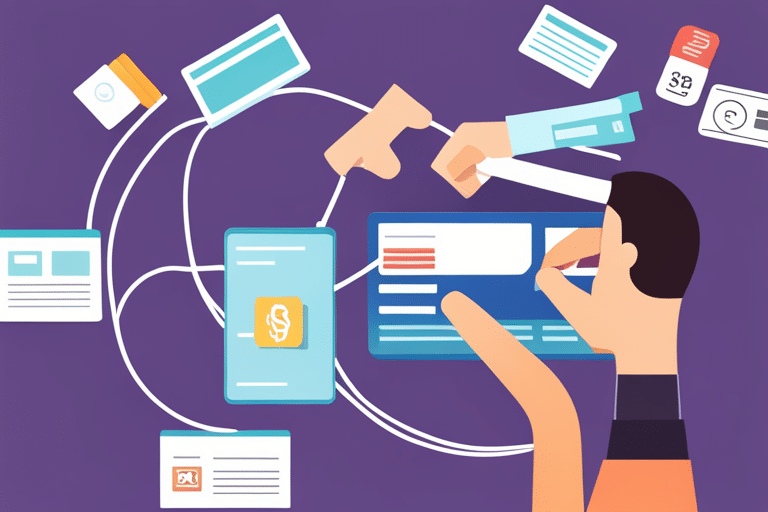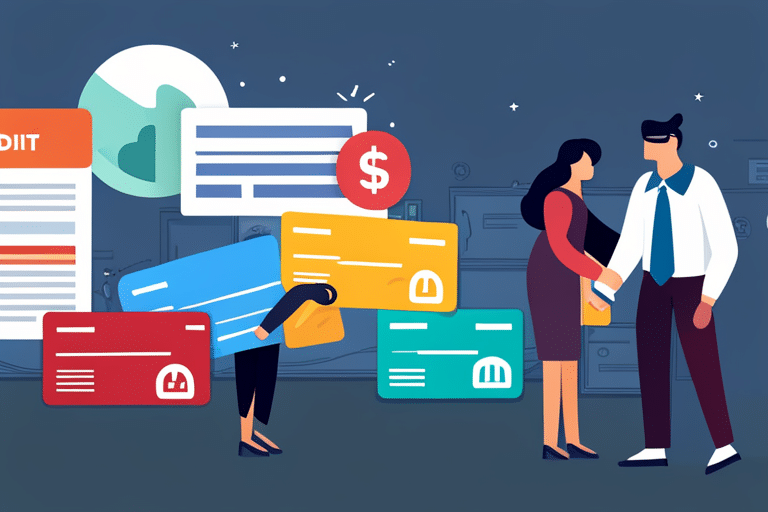Hey there! Ever wondered how your credit score is affected by the different types of credit you use? Well, buckle up because we’re about to dive into the nitty-gritty.
From credit cards to loans, mortgages to auto loans, and even student loans, each one plays a unique role in determining your creditworthiness.
So grab a cup of coffee and get ready to master the art of managing your various debts for a healthy credit score.
Let’s go!
Key Takeaways
- Credit card utilization is a key factor in determining your credit score.
- Having a mix of different types of credit, like personal loans and car loans, is important for maintaining a healthy credit score.
- Retail store credit accounts can impact credit score due to high interest rates and low limits.
- Making timely mortgage payments is crucial for maintaining a good credit score.
The Impact of Credit Cards on Your Credit Score

Credit cards can have a significant impact on your credit score. It’s like being in a long-term relationship with your credit score – you want to make sure it stays happy and healthy.
One of the key factors that determine your credit score is your credit card utilization. This fancy term simply means how much of your available credit you’re actually using. Think of it this way: imagine you have a pizza with eight slices, and you eat four slices. That means you’ve utilized 50% of the pizza. Now, let’s say that pizza represents your overall credit limit, and each slice is equivalent to $1000 of available credit. If you only spend $2000 out of the potential $8000, then congratulations! You’ve utilized only 25% of your credit.
Why does this matter? Well, lenders like to see that you’re not maxing out all your available credit because it shows responsible spending habits. Keeping your utilization low helps improve your score and makes lenders more likely to trust you with their dough.
Another crucial aspect is your payment history on those shiny pieces of plastic we call credit cards. Just like remembering to feed the fish or water the plants, paying off those monthly bills on time is essential for maintaining a good relationship with both Fido and FICO.
Understanding the Relationship Between Loans and Credit Scores

So, you’ve got your credit cards sorted out and now it’s time to dive into the world of loans and how they can impact your credit score.
Let’s talk about the different types of credit you can have, like personal loans or car loans, and how each one plays a role in determining your creditworthiness.
We’ll also touch on why having a mix of different types of credit is important for maintaining a healthy score.
Ready? Let’s go!
Types of Credit
When you’re looking to improve your credit score, it’s important to consider the various types of credit you have. One key factor to pay attention to is your credit card utilization. This refers to the percentage of your available credit that you are currently using. To maximize your score, aim for a utilization rate below 30%.
So, if you have a total credit limit of $10,000 across all your cards, try not to carry more than $3,000 in balances at any given time.
Another type of credit worth mentioning is retail store credit. While it may seem tempting to open multiple store cards for those irresistible discounts and perks, be cautious as they can impact your score. These retail accounts often come with high interest rates and low limits compared to traditional credit cards. Having too many active retail store accounts can lower your average account age and increase the overall amount of debt you owe.
Impact on Score
To improve your credit score, it’s crucial to understand how various factors can impact it. Your credit score is like a delicate balancing act, where even the smallest changes can make a big difference. Let’s take a closer look at some key factors that affect your credit score:
| Credit Score Factors | Impact |
|---|---|
| Payment history | Major |
| Credit utilization | High |
| Length of credit | Medium |
| New credit | Low |
As you can see from the table above, payment history has the biggest impact on your credit score. So, always make sure to pay your bills on time. Credit utilization and length of credit are also important factors to consider.
Now that you understand how different factors can influence your credit score, let’s dive into another important aspect: the importance of having a good mix of credits in your profile.
Credit Mix Importance
Having a good mix of credits in your profile is crucial for maintaining a healthy credit score, my friend. The credit mix impact on your score is determined by a few factors. It’s like making a delicious recipe – you need all the right ingredients to create something truly scrumptious. Similarly, having a variety of credit types like credit cards, loans, and mortgages shows that you can handle different financial responsibilities.
So, what are these credit mix factors? Well, lenders want to see that you can juggle different kinds of debt without breaking out into a cold sweat. They want to know if you’re responsible with both revolving credit (like credit cards) and installment loans (like car loans). It’s all about balance, my friend!
Speaking of mortgages, let’s dive into how they can influence your credit score.
How Mortgages Can Influence Your Credit Score

Alright, buckle up because we’re diving into the exciting world of mortgages and credit scores!
You might be surprised to learn just how much your mortgage can impact your credit score.
We’ll be exploring everything from the importance of making timely payments to how your mortgage debt and utilization can affect your overall credit health.
Get ready for some mortgage-related credit score knowledge bombs!
Mortgage Impact on Score
If you have a mortgage, it can significantly impact your credit score. Your mortgage payment history and mortgage credit utilization play a big role in determining how your credit is affected. Here’s what you need to know:
-
Mortgage Payment History: Making your mortgage payments on time is crucial for maintaining a good credit score. Missed or late payments can negatively impact your creditworthiness and make it harder for you to obtain future loans.
-
Mortgage Credit Utilization: Similar to credit card utilization, the amount of your outstanding mortgage debt compared to the total available limit can affect your credit score. Keeping your mortgage balances low relative to the value of the property can help improve your credit standing.
-
Overall Impact: Managing your mortgage responsibly by making timely payments and keeping debts in check can boost your creditworthiness and open up more financial opportunities for you.
So remember, paying attention to these factors will not only help you maintain a healthy credit score but also pave the way for successful homeownership!
Now let’s dive into why timely mortgage payments are so important…
Timely Mortgage Payments
Making timely mortgage payments is crucial for maintaining a good credit score and ensuring successful homeownership. Your credit score reflects your financial responsibility, and consistently paying your mortgage on time demonstrates that you are a reliable borrower. To give you a better understanding of the impact of timely mortgage payments on your credit score, take a look at this table:
| Payment History | Credit Score Impact |
|---|---|
| Timely Payments | Positive |
| Late Payments | Negative |
| Missed Payments | Very Negative |
As you can see, making timely mortgage payments has a positive effect on your credit score. It shows lenders that you are trustworthy and capable of managing your finances responsibly. By prioritizing these payments, you’ll not only safeguard your creditworthiness but also pave the way for future financial opportunities.
Now let’s explore how mortgage debt and utilization play a role in shaping your overall credit profile.
Mortgage Debt and Utilization
Mortgage debt and utilization impact your overall credit profile. Sounds serious, right? But don’t worry, we’ve got you covered! Here are three key things to know about managing your mortgage:
-
High Mortgage Debt: Having a lot of mortgage debt can weigh you down financially and affect your credit score. It’s important to find the right balance between borrowing and affordability. Keep an eye on how much you owe compared to the value of your home.
-
Utilization Matters: Just like with credit cards, how much of your available mortgage credit you use can impact your score. Aim to keep your utilization rate low by not maxing out your mortgage.
-
Stay on Top: Make sure to stay up-to-date with your mortgage payments and avoid any late or missed payments. Timely payments are crucial for maintaining a healthy credit profile.
The Role of Auto Loans in Determining Your Creditworthiness

When it comes to determining your creditworthiness, auto loans play a significant role in shaping your credit score. Sure, they may not be as glamorous as credit cards with their fancy rewards and cash back offers, but don’t underestimate the impact auto loans can have on your financial reputation.
You see, lenders love to see a healthy mix of different types of credit on your report. It shows them that you’re responsible and capable of handling various financial obligations. And what better way to diversify your portfolio than by adding an auto loan into the mix?
Auto loans demonstrate that you’re able to make consistent monthly payments over an extended period of time. This kind of commitment reflects positively on your creditworthiness and can boost your score significantly. Plus, having a successful history with an auto loan makes it easier for you to get approved for future loans, whether it’s for a car upgrade or even a mortgage.
But wait, there’s more! Auto loans also have another hidden benefit – they can offset the impact of credit card debt. You see, credit cards tend to carry higher interest rates compared to auto loans. By taking out an auto loan and making regular payments on time, you show lenders that you’re actively managing your debt and not drowning in high-interest charges.
Examining the Effect of Student Loans on Your Credit Score

Alright, buckle up because we’re about to dive into the wild world of student loans and their impact on your credit score. Brace yourself, my friend, because it’s going to be a bumpy ride. But fear not, for I am here to guide you through this treacherous journey.
-
Credit Utilization: Just like with any type of credit, your utilization rate plays a big role in determining your creditworthiness. Essentially, this fancy term refers to how much of your available credit you’re actually using. So if you have a $10,000 student loan and you’ve only paid off $2,000 so far, that means you’re utilizing 20% of your available credit. Remember, the lower the utilization rate, the better it is for your credit score!
-
Managing Student Loan Debt: Now that we know how important credit utilization is for our precious credit scores, let’s talk about how to manage those pesky student loans. It’s crucial to make all of your payments on time (duh!) and try not to miss any deadlines (double duh!). Set up automatic payments if possible so you never have to worry about forgetting.
-
Stay on Top of Your Balances: Lastly, keep an eye on those balances! You don’t want them lingering around like unwanted houseguests who refuse to leave. Make it a priority to pay down your student loan debt as quickly as possible while still staying within your budget.
And there you have it – the impact of student loans on your credit score and some tips for managing them like a pro! But don’t go anywhere just yet because in our next section we’ll discuss the importance of managing and repaying personal loans for a healthy credit score.
The Importance of Managing and Repaying Personal Loans for a Healthy Credit Score

Now that we’ve explored the impact of student loans on your credit score, let’s delve into why managing and repaying personal loans is crucial for maintaining a healthy credit score. Personal loans can have a significant impact on your credit score, so it’s important to handle them with care.
When you take out a personal loan, it becomes part of your credit history. Lenders look at your credit history to determine whether or not they should lend you money in the future. If you manage your personal loans responsibly and make timely payments, it shows lenders that you are reliable and trustworthy. On the other hand, if you miss payments or default on your loan, it can have a negative impact on your credit score.
To help you visualize the importance of managing and repaying personal loans, let’s take a look at this table:
| Managing Credit Cards | Impact of Personal Loans |
|---|---|
| Responsible use | Positive effect |
| Timely payments | Builds credit history |
| Low utilization | Increases credit score |
As you can see from this table, responsible management of both credit cards and personal loans has a positive impact on your overall credit score. By using your credit cards wisely and making timely payments on your personal loans, you can build a strong credit history and increase your credit score.
Frequently Asked Questions
How Long Does It Take for a Credit Card Application to Affect Your Credit Score?
When you apply for a new credit card, it can affect your credit score immediately, but the impact may be temporary. Closing a credit card account can also have an impact on your score, so consider it carefully.
Can Multiple Student Loans From Different Lenders Have a Different Impact on Your Credit Score?
Having multiple student loans from different lenders can have a different impact on your credit score. It depends on factors like how you manage them and your credit utilization. So, be mindful of how you handle those loans!
Does Paying off a Mortgage Early Have a Positive Effect on Your Credit Score?
Paying off a mortgage early can have a positive effect on your credit score. It shows responsible financial behavior and reduces your overall debt. Plus, who doesn’t love the feeling of owning your own home?
Can Having Multiple Auto Loans at the Same Time Negatively Affect Your Credit Score?
Having multiple auto loans at the same time can affect your credit score in various ways. While it may increase your total debt and lower your credit utilization, it also shows that you can handle different types of credit responsibly.
How Does the Length of a Personal Loan Term Affect Your Credit Score?
The length of your personal loan term can have an impact on your credit score. It’s all about the relationship between the two. So, choose wisely and watch that score soar!
Conclusion
So, now you know how different types of credit can affect your credit score! Whether it’s credit cards, loans, mortgages, auto loans, or student loans, each one plays a role in determining your creditworthiness.
But don’t worry, managing and repaying these debts is the key to maintaining a healthy credit score.
So why wait? Start building that stellar credit rating today! Remember: isn’t it time you took control of your financial future?

